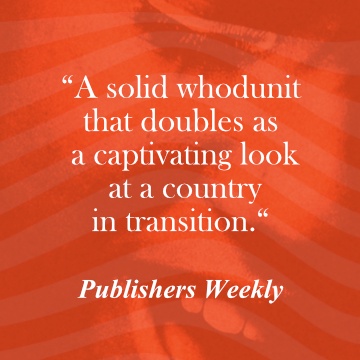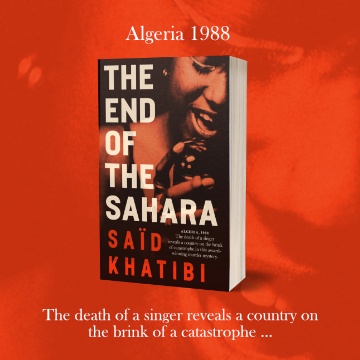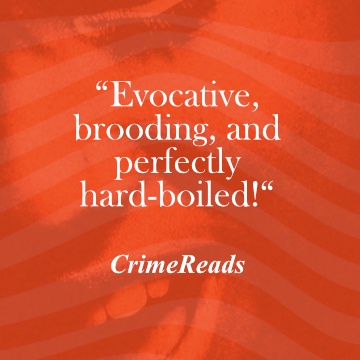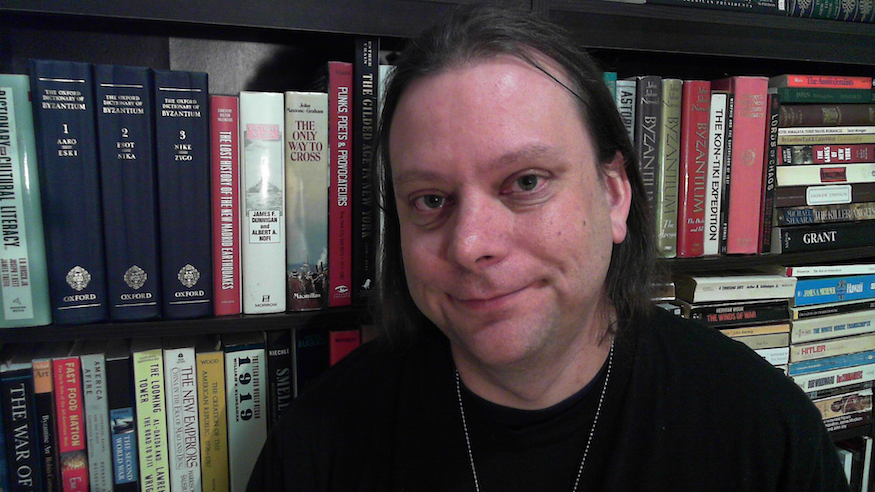
Sean Munger is an Oregon-based LGBT crime author who loves the freedom that writing crime novels gives him. He sees his books as a place to craft characters and narratives, turning over a variety of social issues and exploring different areas of the world with his readers.
His latest, The Son Thief, arrives on 2 August, following on from his first crime novel, In Deadly Mirrors. In it, American PI Sara Brinson is hired to find a missing priest by the man’s parents. Evan Tyler is meant to be at a Catholic mission in Namibia but they think he’s disappeared. Thus begins an international tale of intrigue that crosses the globe and involves a highly devious criminal.
By day, Dr Sean Munger, as he’s officially known, is a historian who focuses on the environment and teaches post-secondary students, but the crime scenarios he creates are a world away from that and Sean’s beginnings as a crime author are particularly fascinating. We invited him onto the site to talk about The Son Thief and the big themes he works with in his books.
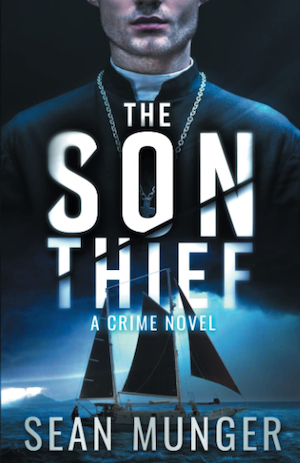
What will crime fiction lovers love about The Son Thief?
I think primarily they will love the characters. That’s what I love about it. They’re all so broken in their own ways, some endearing, others horrifying.
Marcus, the main villain and the ‘son thief’ of the title, is an enigmatic character, and since I deliberately never get into his head, the reader will have to figure out why he does what he does and what he’ll do next. Sarah, the PI, and Giuseppe, the Vatican banker, have their own complicated back-stories that I think readers will connect with and understand. I tried to give even the bit characters – like Moses Mbwele and Jeff Wright, two of the stolen sons – their own quirky personalities. I also think readers will enjoy the snappy pace and the globetrotting nature of the plot. I mean, we go from Namibia to Italy to the Caribbean, which is a tour that even a deranged travel agent couldn’t think up.
Sarah Brinson isn’t your usual PI – who is she and what inspired her?
Women private investigators are fairly rare in the real world, and in fiction they’re often another stripe of noir-ish femme fatale, which I wanted to get away from. Most real world PIs are ex-law enforcement, and Sarah is too, but I made her background primarily military rather than civilian police. The chapter that gives her back story begins during the first Gulf War where she’s corralling surrendered Iraqi troops with an unloaded M-16. There are a lot of LGBT characters in my books, and as Sarah was a lesbian in the military in the 1990s, that alone gives her a particular character arc.
Who or what is she up against here?
The main villain is Marcus Holcomb, AKA Evan Tyler, who appeared in my previous book In Deadly Mirrors. The Son Thief is really his story. He’s a ruthless and sociopathic con artist who’s already had quite a checkered criminal career even before the book starts. Marcus is cunningly intelligent and quite adept at thinking on his feet even in extreme situations, and as the title might imply identity theft is one of his specialties, which makes him extremely hard to find and catch.
What I think readers might find engaging is that he’s so much more of a monster than most of the other characters in the book realise – even Marcus’s pursuers, who generally have differing motivations for chasing him, are often blind to the full scope of his crimes. That makes him an even more dangerous enemy because no one truly understands what he’s capable of. But the reader will understand that!
The novel takes us off to Namibia. What inspired you to choose this setting and how did you research it?
I wanted the book to start in a setting that’s completely unfamiliar to most readers. Namibia is one of those countries that, at least for most English speakers, sort of slides by on the map without drawing much attention. It’s a beautiful country with a tragic history of colonialism. The region where the action begins, the Okovango, is a unique environment that’s exotic, but not in the way stereotypical Africa usually is portrayed in fiction, particularly movies.
Believe it or not, YouTube was a huge help in researching the location. I went searching for videos that were filmed in the small towns of the Okovango region, regardless of subject. I also spent a lot of time reading blogs and travel guides.
Tell us more about how and why you focused on identity theft in The Son Thief?
As a practical matter, where I left Marcus at the end of In Deadly Mirrors, he had to steal someone’s identity and go underground if he was going to survive. So that was the departure point. However, the title and the concept of identity theft operates on a couple of different levels in this book. We’re not just talking about appropriated passports or official documents. (Marcus uses five different identities over the course of the story). He also ‘steals’ various young men in the sense of gaining their loyalty and trust and planting bizarre ideas in their heads that they come to believe completely. In several parts of the story Marcus is seen reading various books including Dale Carnegie’s How to Win Friends and Influence People and a biography of a famous cult leader. These are clues that he’s constantly trying to improve his craft of manipulating people. He’s always on the job, even in his leisure time.
What other themes or ideas do you explore in The Son Thief?
I enjoy incorporating nautical themes into my books, and much of the second half of The Son Thief takes place aboard a ship, once the action leaves Namibia. As I am an LGBT writer I try to bring that in as well, but I deliberately didn’t want to do a story that has an LGBT theme as its main hinge – what I mean is the fact that characters are gay, lesbian or bisexual isn’t the reason the story is happening, it just happens to be a part of who they are. As I mentioned earlier, deception, the manipulation of belief and mind control are other more subtle themes that come up.
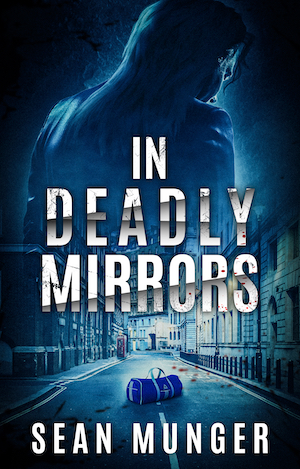
The Son Thief follows In Deadly Mirrors but is a standalone, but what’s the connection between the two?
They’re very different, and that’s deliberate. In Deadly Mirrors focuses on Marcus Holcomb’s early criminal career and particularly a caper involving a gym bag full of terrorist cash that he steals from his gangster employer. The Son Thief picks up almost four years later and begins from a totally different perspective, but there’s a section in the book, which I call in my mind ‘the chase’. This explains what he did with the money and how he eventually winds up hiding out in Namibia. The reader will know all about how the chase went down, but the characters in The Son Thief who get drawn into pursuing Marcus, like Sarah Brinson, don’t have the benefit of the reader’s knowledge and have to piece it together from incomplete clues. I think both books are cracking stories that stand on their own, but readers might enjoy connecting them.
Who are some of your influences?
I read all kinds of stuff, and my influences are pretty wide. My all time favorite author is Umberto Eco, but that obviously doesn’t have a lot to do with the crime genre, although my favourite book of his – The Name of the Rose – is technically a detective story. I’m fairly new to the crime genre and in reading it I tend to gravitate toward the classics like Raymond Chandler and Elmore Leonard. I was just rereading The Long Goodbye and marveling at the artistry of how that story is constructed. So many great ideas all neatly lined up in a row.
You’ve written sci-fi, romance and zombie novels. What made you shift to crime fiction or detective fiction and what’s your take on the genre?
This is going to sound strange, but honestly I started writing crime fiction for my mental health. I suffer from anxiety, and I began writing In Deadly Mirrors at a very dark moment when I needed one or two hours a day where I could escape into an alternate reality and forget about the things that were making me anxious. I chose crime because imagining the world of career criminals means processing the world through a completely different way of thinking than I do in my real life. When I do something I usually think first about whether it’s the right thing to do. A career criminal, like Marcus Holcomb, would think first, how does this benefit me, then what are the risks, and finally how do I get away with it? This is why I prefer to write about criminals as opposed to cops. Police in detective fiction are often constrained by sets of rules and procedures. A criminal has no such constraints. If they want something, they just take it, and the rest of the show is about figuring out how to get away with it. I liked putting myself in this unfamiliar head-space, and as it turned out I was good at it. So maybe I’ve found my niche!
What’s next for Sean Munger?
Two words: Daniel Vanished. As I said I’m fairly new to crime and mystery fiction, and I know I’m new to readers, but if they like me I hope they’ll be interested in the novel I’m working on now, Daniel Vanished. It’s about a cold missing persons case that everyone thinks at first glance is ordinary and uninteresting, but is exceptionally labyrinthine once you start peeling back the layers.
There will also be another book in the In Deadly Mirrors series eventually, but let’s get Daniel and his vanishing out of the way first, and I hope readers find it as engaging and unusual as I do.
Brought to you with the support of The Son Thief and In Deadly Mirrors.











